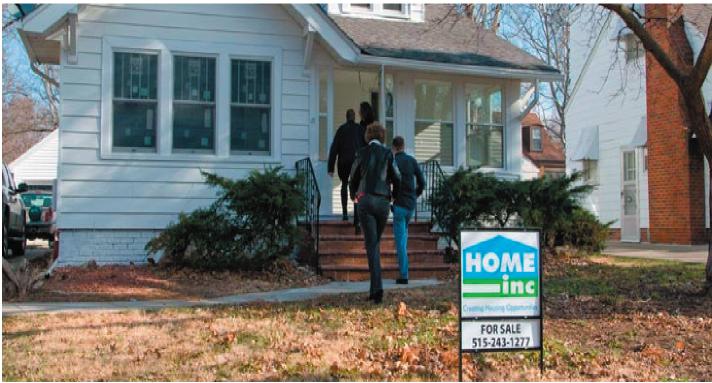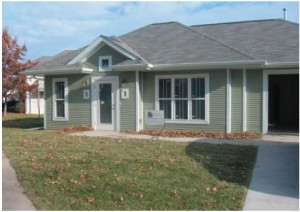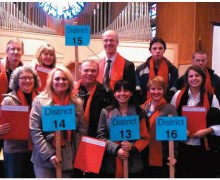Iowa Releases New Study of Local Housing Trust Funds

The Iowa Finance Authority commissioned a study of the Local Housing Trust Fund program and a team from the College of Design’s Department of Community and Regional Planning of Iowa State University has now completed a thorough assessment of the impact of the Local Housing Trust Funds across Iowa: “Iowa’s Local Housing Trust Funds: Strengths, Challenges & Opportunities.”
The Iowa Legislature created the State Housing Trust Fund in 2003 to provide financial assistance for affordable housing throughout the state. The Program contains two portions: the Local Housing Trust Fund Program receives at least 60 percent of available funds to match certified local housing trust funds and the remainder goes to the Project-Based Housing Program available to eligible applicant developers and organizations.
The Iowa Finance Authority Board of Directors approves local housing trust funds, eligible for funds from the state housing trust fund and, to date, 24 local funds have been certified. They serve 81 counties and three cities throughout the state, targeting households with incomes that do not exceed 80% of Iowa’s median household income. Each LHTF must direct at least 30% of their LHTF Program funds to assist households at or below 30% of the state or local median household income.
The study gathered information in three phases: an initial analysis of data to understand trends in housing needs and availability across the state of Iowa; background information obtained from the Housing Assistance Plans and Organization Bylaws of each of the state’s local housing trust funds; and interviews with administrators and/or board members of each local housing trust fund in the state.
The report provides a summary of the current Local Housing Trust Fund program and a discussion of the variations in the local housing trust funds across the state. The report examines the implications from the kinds of affordable housing programs each local housing trust fund supports. The report concludes with recommendations for additional research and some ideas to address issues raised by local trust fund administrators.
Currently, in order to be certified, a local housing trust fund must be an entitlement city, a county or counties in which an entitlement city is located, or one or more COG regions (as identified by Iowa Code). The level of funding possible for the local housing trust fund is based on the geography and the total population of the area. Funding levels are set annually and may vary depending on the amount of funds available. The Iowa Housing Trust Fund is supported through a dedicated portion of real estate transfer tax revenues and has received funds from the Rebuild Iowa Infrastructure Fund (from FY2009 and the next three years). For the 2012 State Housing Trust Fund Local Housing Trust Fund Program $5,004,507 is available and $173,928 is available for the Project-Based Housing Program.
The Local Housing Trust Funds must meet certain organizational requirements which include:
- Creating a governing board that is recognized by the jurisdiction or group of jurisdictions that it serves through the passage of resolutions providing support for the LHTF;
- Adopting organizational bylaws;
- Complying with Iowa’s Open Meetings Law and Open Records Act;
- Submitting a housing assistance plan documenting the needs and intended activities of the LHTF; and
- Scheduling an open meeting for public comment at least once a year
Another basic requirement for an organization to receive IFA funding is procuring a minimum local match of at least 25% of the total funding awarded. The study shows that some trust funds struggle to generate the match requirements while others effectively leverage local sources and exceed the minimum. The interviews also revealed that while most LHTFs get at least some of their annual funding from the cities and counties in which they operate, several LHTF administrators described creative funding strategies that help to stretch their IFA dollars.
So far, every existing LHTF has been able to meet its minimum match, but there are significant differences in the sources of funding that make up that match. Sources included: funding from programs such as the Federal Home Loan Bank or Community Development Block Grant funds and a wide range of local and private sources, including local businesses, community foundations, gaming and racing funds, and private individuals and banks. Rural regional trust fund administrators reported more reliance on each of the participating counties or the hosting COG to provide a major share of the required match.
Iowa’s LHTFs fund a wide variety of housing activities across the entire housing continuum. Some trust funds specialize in one kind of activity, such as furnace replacement, while others fund a range of projects from homelessness prevention to down payment assistance.
The study addresses the influence of both the structure of the state’s housing trust fund program and the agency of local administrators and governing boards in determining the ways that funding decisions are made. The study further explores how these factors shape the demand and supply of affordable housing in Iowa’s communities.
The impact of the housing trust fund has been without question positive, as the program has provided essential support to both directly help people in need of housing assistance and to increase the ability of non-profit organizations to provide housing.

HOUSING TRUST FUND OF JOHNSON COUNTY – The Housing Fellowship, a nonprofit developer, is building six affordable rental duplexes in Iowa City. Trust Fund money is one source of construction financing for the project.
The study’s research indicates that the trust fund has helped increase the overall supply of affordable housing. According to numbers provided by the Iowa Finance Authority, $4.09 has been leveraged for every $1 of LHTF Program investment. To date, more than $76.3 million in other funding has been leveraged.
The study concludes that the trust fund program has significantly improved the ability of local governments, councils of governments, and non-profit organizations to bring the issue of affordable housing to the attention of elected officials, businesses, foundations, and the general public. As the trust fund program matures, its ability to highlight the challenges of affordable housing, to coordinate service providers attempting to address affordable housing needs, and to support the production and conservation of affordable housing will continue to grow.
To obtain or view of a copy of this report, go to: http://www.iowafinanceauthority.gov/documents/filelibrary/shtf/LHTF_FinalReport_Print_ B880E6EE09152.pdf
Contact for information about the Local Housing Trust Fund Program:
Terri Rosonke
Iowa Finance Authority
2015 Grand Avenue, Des Moines, Iowa 50312
(515-725-4956)
terri. rosonke@iowa.gov
Contact for information about the study:
Douglas M. Johnston, PhD.
Department of Community and Regional Planning, College of Design, Iowa State University
(515-294-5490)
www.design.iastate.edu
dmjohnst@iastate.edu








